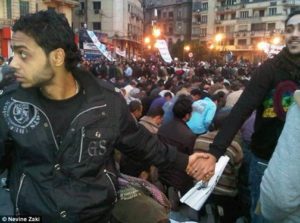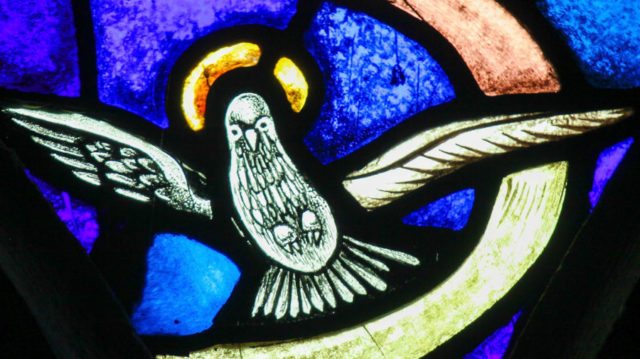The Dignity of Work
The Dignity of Work
They shall build houses and inhabit them;
they shall plant vineyards and eat their fruit.
Isaiah 65:21
Every year, the Presbyterian Mission Agency’s Peacemaking Program sponsors individuals from all over the world to speak on their work for justice and peace in their homelands. This year, ten “International Peacemakers” were chosen, and San Gabriel Valley was the host for one, thanks to Liz Daley, a congregational leader of Calvary Presbyterian Church in South Pasadena.
Fabienne Jean, coordinator of FONDAMA, is spending this week in Southern California, accompanied by Presbyterian World Mission Co-Worker Cindy Correll. FONDAMA stands for “Fondasyon Men Ansanm Ayiti” or “Hands Together Haiti.” My college French helped me figure out this is an example of Haitian Creole for “Fondation Mains Ensemble Haiti.” This community development network advocating for local farmers is in partnership with the PC(USA)’s Presbyterian Hunger Program. Their focus is to listen to the stories and experiences of local farmers, work with them on adaptive agricultural techniques, raise media visibility to their challenges, and alert them to their rights and responsibilities as citizens in this democracy.
You still have opportunities to meet Ms. Jean and Ms. Correll this Wednesday:
- 26, 10:30 am, Westminster Gardens Duarte
- 26, 3 pm, Marwick Place, Monte Vista Grove
You may know about Haiti as the only nation to gain sovereignty and freedom by and for African people enslaved and taken to the Americas. You may know of Haiti as one of the poorest nations in the world (according to our Peacemakers, listed as 17th of the 25 poorest countries). You may know about the terrible earthquake that hit Haiti in 2010, or the Temporary Protective Status which the United States government gave to Haitians fleeing the earthquake’s destruction, or the fact that the government plans to cancel their Temporary Protective Status in July 2019.
Ms. Jean shared that about a third of Haiti’s 10.5 million people face food insecurity. She outlined several causes of the rampant poverty in Haiti:
- Land-grabbing: multinational corporations buy land from the Haitian government in order to grow crops profitable to the multinationals, but taking land that locals used to grow food staples
- Illiteracy: 4 of 10 children in Haiti are not able to go to school, and as we Presbyterians know, education is the best path out of poverty, and lack of education restricts opportunity and self-determination
- Food imports: unrestrained food “aid” from the United States, which dumps excess rice from North American farmers in Haiti, pushes out the local rice farmers and changes the Haitian diet in unhealthy ways
- Deforestation: 50,000 trees are cut down each year in order to make charcoal for fuel, which results in topsoil in this mountainous nation flowing into the sea.
Sadly, as she spoke, I immediately recognized the story, as it has been played and replayed all over the world, for centuries. The kingdom of Hawai`i was illegally overthrown by the United States so that its fertile lands could be used for massive sugar plantations owned by American, British, and German interests. Local food-growing lands in Africa are being converted to luxury crops such as strawberries for international export. Sometimes the land isn’t even used for agriculture; farmland in Southeast Asia was purchased by Japanese for development into golf resorts (though, ironically, golf is now declining, so at least in Japan itself, some golf courses are being converted back to farmland).
But as far back as the Bible, there is clear understanding of economic justice and land use. The motif of who builds houses and lives in them, and who plants vineyards and enjoys its fruit, is repeated several times through the Hebrew Bible, with a few variations:
- In Deuteronomy 6:10-12 and Joshua 24:13, the Israelites are reminded that in Canaan God gave them homes in cities that they had not built, and the fruit of vineyards that they did not plant.
- In Amos 5:11 and Zephaniah 1:13, those who use their power to oppress the poor will no longer be able to live in the houses they build or drink the wine of the vineyards they planted.
- In Amos 9:14 and Isaiah 65:21, the culminating promise of the restoration of Israel is prophesied, as God’s people are again able to build (or rebuild) their houses and cities and live in them, and eat the fruit of the vineyards they plant.
In this micro-sweep of God’s intentions for Israel, we see a vision for shalom for all of us. As I’ve been taught, shalom is not just “peace” however we tend to define it (Is it simply the absence of violence which may be reached through totalitarian order? Or some fairyland where everyone magically loves each other?). Instead, shalom is the culmination of God’s justice finally being established in our midst. If we consider these few verses, we see that God takes the initiative of grace to give what we may not even deserve or work for, and asks in return that we remember God’s blessing and enact justice and forgiveness that honors and emulates God’s grace. However, too often we forget, and we act in ways that are greedy and oppressive, honoring instead the ways of a broken world. While God warns that our greed will result in our destruction, God yet holds out the vision that we may be restored.
While I tend to dream of a time when we all can sit back and eat bon-bons (the animated film “Wall-E” gives a horrifying vision of such a world), it seems that God’s vision is not for us to go on permanent vacation and be waited on. Instead, God’s vision is for us to work, but to be able to benefit from our work.
As developing nations have pointed out, they benefit from this type of grace more than from the flood of oppressive compassion from well-meaning dumps of excess rice, used clothing, or cash that ends up in the hands of sometimes corrupt officials. Certainly there are times when mercy is called for—the Bible speaks often of jubilee, or a time when debt is forgiven, and there have been times when the crushing debt burden of nations has been forgiven. And there are times of crisis when a nation needs outside help. But we now attempt to relate to others not solely as objects of pity and charity, but as sisters and brothers and potential partners in life and ministry, who are just like us as we seek the dignity of purpose and work. When possible, may we take the time to connect with people in need in respectful ways, looking for their core as worthy and wise children of the same God who made us. And may we accept our own limitations, that we know—and share—the persistent and patient grace that God offers all of us.
Thanking God for God’s grace,
Wendy



